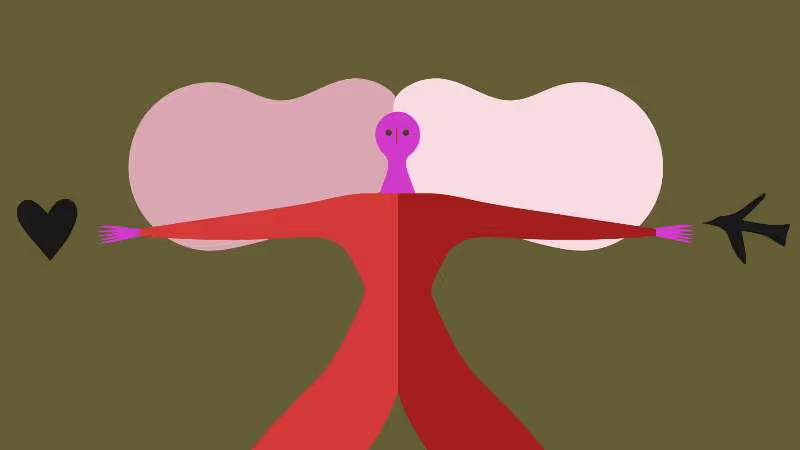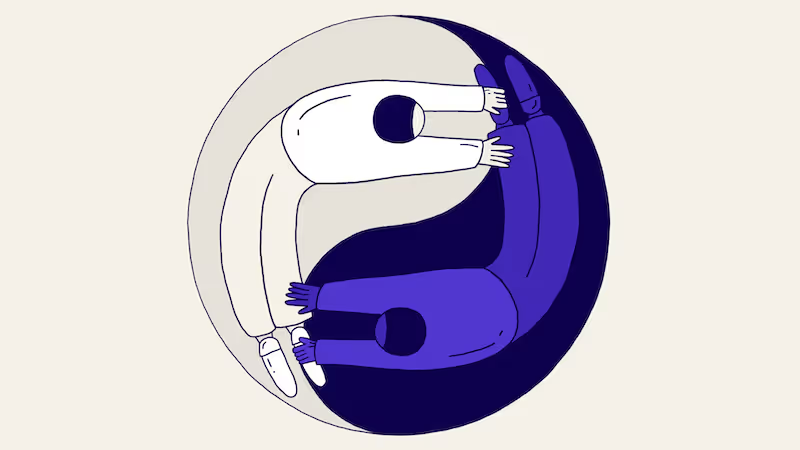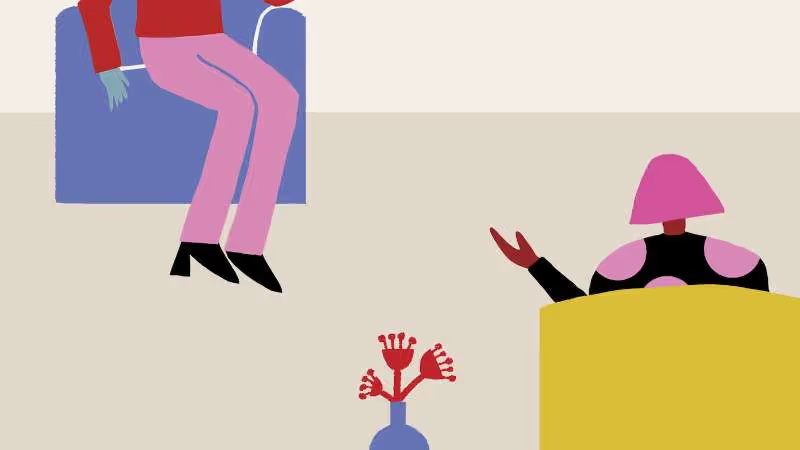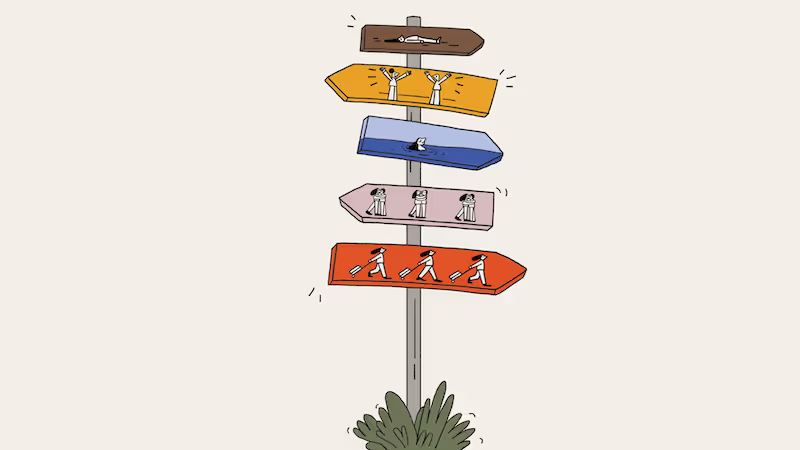What’s the last thing you stroke at night before you fall asleep? What’s the first thing you touch in the morning when you wake up?
Be honest. Is it your phone? And are you holding that phone while there is a person next to you lying in bed with whom you used to talk, cuddle, enjoy quiet time, or make love before falling asleep? Perhaps you’re using social media to escape the terror of our current moment, or you find yourself doom-scrolling into the night, consuming more and more news about Covid-19, protests, and the economy, only to wake up tired, overwhelmed, and unable to talk to your partner about anything else. In a moment of mass virtual connection with the outside world, at the end of day, our internal lives feel a bit lonely. Ironic, isn’t it?
Loneliness isn’t new, but it’s also no longer just about being socially isolated. Over the last decade, we’ve experienced a new type of loneliness—the loss of connection, trust, and capital while we are next to the person with whom we’re not supposed to be lonely. And the isolation that comes with comparing our lives and relationships with the perfectly-curated social media profiles of our friends and people we don’t even know. Recently, as every other dynamic in our lives has been upended, the loneliness dilemma has intensified. In isolation, we’re spending more time online than ever before, working and desperately trying to keep up with new information. But we’ve also been thrown into the main emotion that underscores loneliness in a brand new way: Ambiguous Loss, a field first created by Pauline Boss. It’s what we feel when a loved one is physically present, but in all other ways absent from a relationship:
- Have you ever experienced your partner half-listening, face alight in the soft blue glow of the phone? You’re talking to them but they’re elsewhere, in the digital vortex.
- How about that lag on the phone when you’re talking to a family member who you suspect is surreptitiously multi-tasking or checking their social media?
- Do you have a friend to whom you consistently reach out only to hear back a few days later with a feigned wish to catch up, but never a commitment?
- Are you finding yourself filled with feelings weirdly reminiscent of middle school as you negotiate who you can see—and who you want to see? And who wants to see you?
All of these situations leave us hungry for connection. It’s like eating without being satiated, food without sustenance. At this moment, Ambiguous Loss has created an even greater hunger. We walk the streets, but they’re not the same. We go to our favorite surviving restaurants, but we don’t step foot in the door. Even home life has changed, as my friend Carmen Firan described in the Spring issue of Lettre Internationale: “It was enjoying a read in solitude before, but it is stressful to do now, in isolation, under stress.” That solitude can be unbearable at times now.
Unable to mourn the mountain of losses we’ve experienced this year, we’re left with unresolved grief. And we expect our relationships to hold the weight of that grief. How many of us are feeling our partnerships collapse under that heaviness? At this point, it may seem easier to connect with our phones than with each other. But what’s to show for it—are we in an apex of loneliness?
Crisis Can Leave Us Feeling Alone in a Relationship
We have a knack for delegating uncomfortable feelings. In moments of crisis, our already differing coping mechanisms become more extreme. Worried and stressed, one partner maximizes while the other one, trying to keep things calm, minimizes. The one who worries leaves the soothing to the other. The one who soothes refuses to worry. If we tend to over-activate, the other will under-activate. We see this in our conversations, our planning, our sex lives, our desire to try new things, and more.
When the issues of the outside world come inside our homes, as they always do, it fuels our connection—“we both feel passionate about racial equality”—as much as it fuels our seemingly unbridgeable differences. “She wants to send the kids back to school; I feel it’s not safe and that we need to come up with a way to homeschool them.” This month, I’ve been writing and speaking about how the challenges in the public square often play out at our dinner tables. These ongoing debates become a river of tension that forms the undercurrent of every conversation.
The year 2020 has been a chaotic whirlwind of prolonged uncertainty. But 2020 is not the sum total of your whole relationship. Your relationship is not the state of the world or politics. It may seem silly, but we have to remind ourselves and our partners that many of our fights right now are playing out at every dinner table in every home. That fundamentally means that we’re not alone. Don’t be afraid to reach out to friends or even to virtual forums like Reddit’s r/rrelationship_advice section, like this woman did. It may surprise some of us to know that our partner feels lonely, too, even if they don’t say so.
When Feeling Alone in a Relationship Becomes the Norm
What is more difficult are the problems that have always been there, that have only gotten worse in the past few months. For those of us who had already been living on separate continents under the same roof, that separateness has only intensified while living on top of each other 24/7. I’ve said it before: crisis exacerbates existing tensions—within our society, and within our partnerships. If we felt alone in a relationship before, this year has revealed new depths of that loneliness. I frequently hear the varied situations:
- The partner who feels that they have to always initiate every conversation
- The partner who wishes the conversation would end when there’s nothing left to say
- The partner who resists conversations altogether because they’ve never seen anything good come out of them
- The partner experiencing a lack of empathy
- The partner who doesn't feel safe to bring anything up because the other takes it as criticism and responds defensively
- The partner who makes everything about them
- The partner desperate for physical intimacy, experiencing lack of touch as sexual rejection
That last one comes up frequently in the new season of my podcast Where Should We Begin? In “The Chronic Philanderer,” a woman speaks poignantly about what it feels like when her husband, with whom she wanted an intimate relationship, replaces her with another woman. In an episode coming out later this season, a couple reveals that they haven’t touched each other in six months. We discuss the effects it's had on their relationship and how to reconnect. As I shared with Krista Tippett on her podcast On Being, it is so hard to feel lonely when we are next to someone with whom we once did not feel that way, especially when we’re in a relationship in which we may even be a loved and cherished spouse, but remain a famished lover. Being loved and being desired is not the same. Feeling sexually rejected is an emotional loneliness of its own kind.
When we feel alone in a relationship, every room in our home becomes a stage upon which loneliness performs. We see our solitude in the overcooked rice that we begrudgingly made as our partner played video games or took “me time” scrolling Instagram. We see desolation in the bathroom mirror when we wonder if our partner still finds us attractive. In the yard, we see our kids forming bonds with the “fun parent,” whose vetoed petition to take the kids to the playground despite the risk of Covid-19, is now making up an imaginary world for them on the property. The depth of solitude becomes unbearable when we wonder why our partner can so easily access their imagination and their sense of playfulness with others, but not with us.
Reconnection Requires Going a Different Way
Getting to a new depth of connection means taking a different path to get there. That path is full of hard conversations that I want to help you have. Let’s start here:
- Make an appointment around an activity and set a time limit: “Can we take a fifteen minute walk tonight to talk about some things?”
- Changing the environment by taking a walk together, a bath, or having coffee together in the morning can help shake up the conversational rut.
- Preface the conversation by acknowledging that you know that it might not be pleasant and that you appreciate that they are willing to engage.
- Mention a productive conversation you had together recently.
- Keep it to one issue at a time.
- Try listening to them from a place of curiosity and inquisitiveness.
- If your partner indicates that they feel overwhelmed, or if they start to shut down, there is no need to answer “but I didn’t do anything.”
- Just ask them: “tell me more.
- Know that one of the most powerful ways for people not to feel deeply alone is for them to feel listened to.
- And listening doesn’t mean agreeing. Remind yourself and them of this.
- Likewise, acknowledging another person’s experience doesn’t invalidate your own.
- Don’t compete by upstaging their grievances with your own. Ask them to do the same for you.
- Remember that you’re not responsible for making their negative feelings go away in this situation.
- And they’re not responsible for making your negative feelings go away.
- Remind each other that you’re not going to solve all of your issues in one conversation, but every conversation is an important step.
- You can always ask your partner, “is there something I can do to make the conversation more productive?"
- If the conversations feel impossible, try writing to each other. It can make all the difference.
Lastly, remember the context we’re all living in right now. People prone to depression, anxiety, and stress are triggered. People who are experiencing those issues for the first time may not realize or understand why they are feeling and acting the way they are. Instead of approaching the conversation with “You’re making me feel like X,” or “you never do Y,” try “I’m worried about you.” These times require frequent pulse checks with one another. Even the seemingly small act of being present while you check in on a loved one—really being there with them and listening to them—can up new channels of connection.








.svg)





